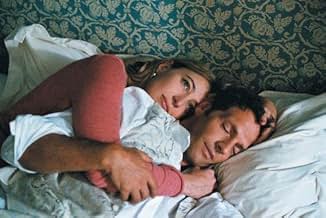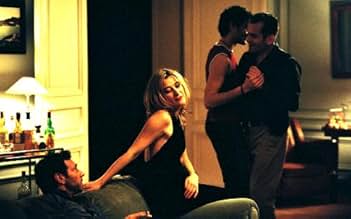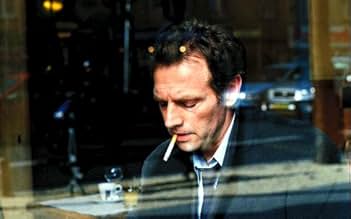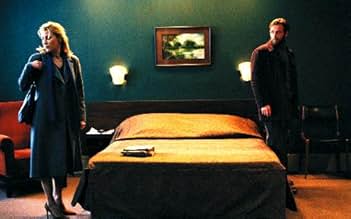IMDb-BEWERTUNG
6,6/10
10.693
IHRE BEWERTUNG
Fünf Phasen in der Romanze zwischen einer Frau und einem Mann.Fünf Phasen in der Romanze zwischen einer Frau und einem Mann.Fünf Phasen in der Romanze zwischen einer Frau und einem Mann.
- Regie
- Drehbuch
- Hauptbesetzung
- Auszeichnungen
- 1 Gewinn & 2 Nominierungen insgesamt
Valeria Bruni Tedeschi
- Marion
- (as Valeria Bruni-Tedeschi)
Ninon Brétécher
- Sophie
- (as Ninon Bretecher)
Empfohlene Bewertungen
10ellkew
This is one of the most resonant films I have seen for a long time. Superb performances by both leads and a simple but very effective structure. To begin at the end and move backwards to look at moments, glimpses, fragments is such a simple device yet devastatingly effective as demonstrated with such expertise by Ozon here. I found certain moments deeply moving such as the physical assault on his wife. It seemed like a desperate attempt by the husband to try and claim power over his wife. But we know that the relationship is in the final throes of death. I loved the scene on the wedding night when she looks at her mother and father who we have previously seen rowing, just dancing alone at the reception. Somehow you know that their relationship will last and there is hope for them. The adultery the wife commits seemed to work although at first I thought it too contrived. Her pleasure on seeing her husband and love for him as he sleeps when she creeps back into the room felt very real. For me however the most beautiful and most moving sequence was the end when they first meet. It was wonderfully set up and echoed real life so well. It is always a series of events, a chain that causes all the pieces to fall in the right place and the couple to meet. It such a subtle scene when they talk on the beach as we know they are about to fall in love. When they walk into the golden sea bathed in light the two are literally becoming one as they embark on a new chapter in both their lives. The beauty of the scene is made more powerful by the conflicting emotion in our minds as we know that this love will be destroyed. How can something so perfect ever diminish? What Ozon is saying is that all things must die, that surely it is better to have loved and lost than never to have loved at all. Go and see this film. It is marvellous.
5x2 comes as a slight let-down following director Francois Ozon's recent critical and commercial success with Swimming Pool.Ozon's decision to structure the film in an anti-linear fashion is nothing original and he himself admits he was influenced by Jane Campion's little-known TV film Two Friends (1985) which used the same structure. Ozon chooses 5 crucial scenes from the life of Marion and Gilles, a middle-class couple with a son, Nicholas, whose married life quickly disintegrates into divorce. Ozon begins with the austere divorce, finishing with the moment this would-be-couple met.
The reverse structure allows the viewer to consider what went wrong and decipher why the marriage ended so bitterly. It is fairly obvious the reasons why they divorced, but Ozon and his frequent collaborator, Emmanuelle Bernhein, are as interested in the psychological worlds of these two people as their mundane reality.
The film works for the most part, but some scenes are unbelievable: Gilles's boastful confession at the party with his brother; the scene in the woods with Marion and an American tourist. These scenes undermine the subtle nature Ozon employs elsewhere. He explains too much, which isn't his style. A better edit would have made this an even better film.
As for the music, the corny 1960's Italian love songs used to close each segment are plain awful. The triviality of the songs might offer an ironic counterbalance to what is happening on screen, but the effect is of a sneering, sardonic detachment on behalf of the director. It's as if Ozon wants to dismiss every aspect of romantic culture as a fallacy.The best musical segment is at the end where Ozon's longtime composer Philippe Rombi returns some panache to the film's audio sensibilities. Special mention should go to Paolo Conte's haunting Sparring Partner which is used in the dinner scene and in the final credits.
The acting is excellent,and the closing frame is a masterstroke.But it doesn't merit that many repeat viewings as his earlier Swimming Pool did.
The reverse structure allows the viewer to consider what went wrong and decipher why the marriage ended so bitterly. It is fairly obvious the reasons why they divorced, but Ozon and his frequent collaborator, Emmanuelle Bernhein, are as interested in the psychological worlds of these two people as their mundane reality.
The film works for the most part, but some scenes are unbelievable: Gilles's boastful confession at the party with his brother; the scene in the woods with Marion and an American tourist. These scenes undermine the subtle nature Ozon employs elsewhere. He explains too much, which isn't his style. A better edit would have made this an even better film.
As for the music, the corny 1960's Italian love songs used to close each segment are plain awful. The triviality of the songs might offer an ironic counterbalance to what is happening on screen, but the effect is of a sneering, sardonic detachment on behalf of the director. It's as if Ozon wants to dismiss every aspect of romantic culture as a fallacy.The best musical segment is at the end where Ozon's longtime composer Philippe Rombi returns some panache to the film's audio sensibilities. Special mention should go to Paolo Conte's haunting Sparring Partner which is used in the dinner scene and in the final credits.
The acting is excellent,and the closing frame is a masterstroke.But it doesn't merit that many repeat viewings as his earlier Swimming Pool did.
The reverse chronology brings together what all too often tears us apart, wait it's love, love that tears us apart. Marriage really is a different thing altogether.
The film feels to a degree like flipping through old photographs, nostalgia is a form of pain, right? What was interesting was to see the actors really portraying quite different characters in the five sets, although had I seen the French Remix where the scenes are re-reversed, perhaps it would have all seemed more fated and just an unwrapping of a bitter, broken wedding gift.
I did wonder if the movie was filmed in proper chronological order.
There is something about maid Marion's parents, that is placed on a very tiny pedestal, without much explanation. I found compassion in watching Valerie Bruni-Tedeschi here...while her lesser half did not get much of a fair chance at redemption.
All of us, and all of our partners are flawed. But perhaps not all relationships are fatally flawed. Find someone emotionally compatible and give it a shot, maybe savor the best memories periodically. Good luck...
The film feels to a degree like flipping through old photographs, nostalgia is a form of pain, right? What was interesting was to see the actors really portraying quite different characters in the five sets, although had I seen the French Remix where the scenes are re-reversed, perhaps it would have all seemed more fated and just an unwrapping of a bitter, broken wedding gift.
I did wonder if the movie was filmed in proper chronological order.
There is something about maid Marion's parents, that is placed on a very tiny pedestal, without much explanation. I found compassion in watching Valerie Bruni-Tedeschi here...while her lesser half did not get much of a fair chance at redemption.
All of us, and all of our partners are flawed. But perhaps not all relationships are fatally flawed. Find someone emotionally compatible and give it a shot, maybe savor the best memories periodically. Good luck...
The end and beginning of the love of the French couple Marion (Valeria Bruni-Tedeschi) and Gilles (Stéphane Freiss) is disclosed backwards through five moments in their lives:
1st moment: They divorce and have one last brutal intercourse without love.
2nd moment: With their relationship shaken, they have a dinner party with Gilles's gay brother Christophe (Antoine Chappey) and his younger mate, when an infidelity is disclosed at the dinner table.
3rd moment: The troubled pregnancy of Marion and the delivery of their premature son Nicolas, with the total absence of Giles.
4th moment: Their wedding, when Marion commits adultery with an unknown guest of the hotel.
5th moment: .When they meet each other in an Italian resort and begin their relationship.
This simple and realistic movie recalls "Irreversible" (2002), since the screenplay discloses five moments of the relationship of a couple chronologically backwards. I believe the first intention of François Ozon is to remember that behind every divorce, there is a couple that loved each other in the past, that decided to marry each other expecting to live together and raise a family of their own. However, relationships usually deteriorate and time destroys everything including love. In these fragmented glimpses of the lives of Marion and Gilles, the viewer does not see exactly when their love ended, but after their initial encounter, there are many signs suggesting the beginning of the end: the adultery of Marion in the wedding night; the absence of Gilles in the birth of his son; his consented participation in an orgy in the presence of Marion, visibly showing one sort of last attempt to save their empty marriage. Further to the good screenplay, the outstanding and strong performances of the sexy Valeria Bruni-Tedeschi and Stéphane Freiss give the credibility to the characters. My vote is seven.
Title (Brazil): "Amor em 5 Tempos" ("Love in 5 Times")
1st moment: They divorce and have one last brutal intercourse without love.
2nd moment: With their relationship shaken, they have a dinner party with Gilles's gay brother Christophe (Antoine Chappey) and his younger mate, when an infidelity is disclosed at the dinner table.
3rd moment: The troubled pregnancy of Marion and the delivery of their premature son Nicolas, with the total absence of Giles.
4th moment: Their wedding, when Marion commits adultery with an unknown guest of the hotel.
5th moment: .When they meet each other in an Italian resort and begin their relationship.
This simple and realistic movie recalls "Irreversible" (2002), since the screenplay discloses five moments of the relationship of a couple chronologically backwards. I believe the first intention of François Ozon is to remember that behind every divorce, there is a couple that loved each other in the past, that decided to marry each other expecting to live together and raise a family of their own. However, relationships usually deteriorate and time destroys everything including love. In these fragmented glimpses of the lives of Marion and Gilles, the viewer does not see exactly when their love ended, but after their initial encounter, there are many signs suggesting the beginning of the end: the adultery of Marion in the wedding night; the absence of Gilles in the birth of his son; his consented participation in an orgy in the presence of Marion, visibly showing one sort of last attempt to save their empty marriage. Further to the good screenplay, the outstanding and strong performances of the sexy Valeria Bruni-Tedeschi and Stéphane Freiss give the credibility to the characters. My vote is seven.
Title (Brazil): "Amor em 5 Tempos" ("Love in 5 Times")
The 'reverse chronology' format, that has now been tried and tested a few times, will perhaps one day become as unshockingly acceptable as the more prosaic use of 'flashbacks'. Both involve non-linear storytelling, and both attempt to grab audience attention by time distortions. Flashbacks are now so commonplace within mainstream films that the 'purist' Dogme movement banned them altogether being so structurally clichéd and rarely justified. So when Ozon's 5 x 2 tells a love story about two people in five chapters, but starting with the last chapter and working forward, is he using a valid artistic device or just being gimmicky? In the opening scene, our loving couple (Marion and Gilles) are finalising the details of their divorce. Afterwards they have a last-fling sexual bout which takes an unpleasant turn. Flipping back scene by scene, we next see them as a loving married and entertaining visitors, chatting away about fidelity and sexual deviance and again we see a slightly unpleasant turn perhaps the seeds of the divorce that we already know will happen. In each chapter we follow the love story to earlier and earlier stages.
In Irreversible, another French film, the reverse chronology format was used to shock, to take us on a journey from hell to heaven. In Memento it was used to heighten suspense and provide the basic device that the mystery revolved upon we never knew more than the main character about what had happened before.
In 5 x 2 the effect is to highlight small things that go wrong in a fairly ordinary relationship. If it were a gradual decline from better to worse they might have gone unnoticed, but our starting point being divorce our interest in why things went wrong is perhaps more acute.
The other thing that marks out this slightly unusual film is the remarkable acting range shown by Valeria Bruni Tedeschi (who won Best Actress at the Venice Film Festival for her portrayal of Marion). We see not only an incredible range of emotion but many sides to her character. The finely nuanced performance draws attention to things like the person a woman may be to her husband whilst still have a secret side, or her ability to put on a brave face when crying inside. The observation of a range of emotional and sexual explorations is done with the attention to detail that seems so intrinsic to much French cinema: the characters really seem to feel what is happening as if there is no camera on them at all. Sadly 5 x 2 however may not have the shock value of film like Irreversible or the sugar-candy feelgood factor of films like Amelie: mainstream foreign audiences like their French movies to nevertheless fulfil certain passive entertainment criteria, which this thinking and understated movie obstinately refuses to do.
In Irreversible, another French film, the reverse chronology format was used to shock, to take us on a journey from hell to heaven. In Memento it was used to heighten suspense and provide the basic device that the mystery revolved upon we never knew more than the main character about what had happened before.
In 5 x 2 the effect is to highlight small things that go wrong in a fairly ordinary relationship. If it were a gradual decline from better to worse they might have gone unnoticed, but our starting point being divorce our interest in why things went wrong is perhaps more acute.
The other thing that marks out this slightly unusual film is the remarkable acting range shown by Valeria Bruni Tedeschi (who won Best Actress at the Venice Film Festival for her portrayal of Marion). We see not only an incredible range of emotion but many sides to her character. The finely nuanced performance draws attention to things like the person a woman may be to her husband whilst still have a secret side, or her ability to put on a brave face when crying inside. The observation of a range of emotional and sexual explorations is done with the attention to detail that seems so intrinsic to much French cinema: the characters really seem to feel what is happening as if there is no camera on them at all. Sadly 5 x 2 however may not have the shock value of film like Irreversible or the sugar-candy feelgood factor of films like Amelie: mainstream foreign audiences like their French movies to nevertheless fulfil certain passive entertainment criteria, which this thinking and understated movie obstinately refuses to do.
Wusstest du schon
- WissenswertesIn the French edition of the DVD, the director offers a version of the movie titled "2 x 5". This version shows the five sequences in the chronological order, from the moment the couple meets till their divorce. Subtle editing work has been applied to make the movie work.
- PatzerThe scene where the American came to Marion during the wedding night and introduced himself who arrived in France today and would leave tomorrow for LA. Who would just do that? It's just lame.
(Answer: someone not coming from the USA, for instance.)
Top-Auswahl
Melde dich zum Bewerten an und greife auf die Watchlist für personalisierte Empfehlungen zu.
- How long is Five Times Two?Powered by Alexa
Details
- Erscheinungsdatum
- Herkunftsland
- Offizielle Standorte
- Sprachen
- Auch bekannt als
- Five Times Two
- Drehorte
- Produktionsfirmen
- Weitere beteiligte Unternehmen bei IMDbPro anzeigen
Box Office
- Budget
- 5.250.784 € (geschätzt)
- Bruttoertrag in den USA und Kanada
- 128.752 $
- Eröffnungswochenende in den USA und in Kanada
- 15.667 $
- 12. Juni 2005
- Weltweiter Bruttoertrag
- 7.444.906 $
- Laufzeit
- 1 Std. 30 Min.(90 min)
- Sound-Mix
- Seitenverhältnis
- 1.85 : 1
Zu dieser Seite beitragen
Bearbeitung vorschlagen oder fehlenden Inhalt hinzufügen


























